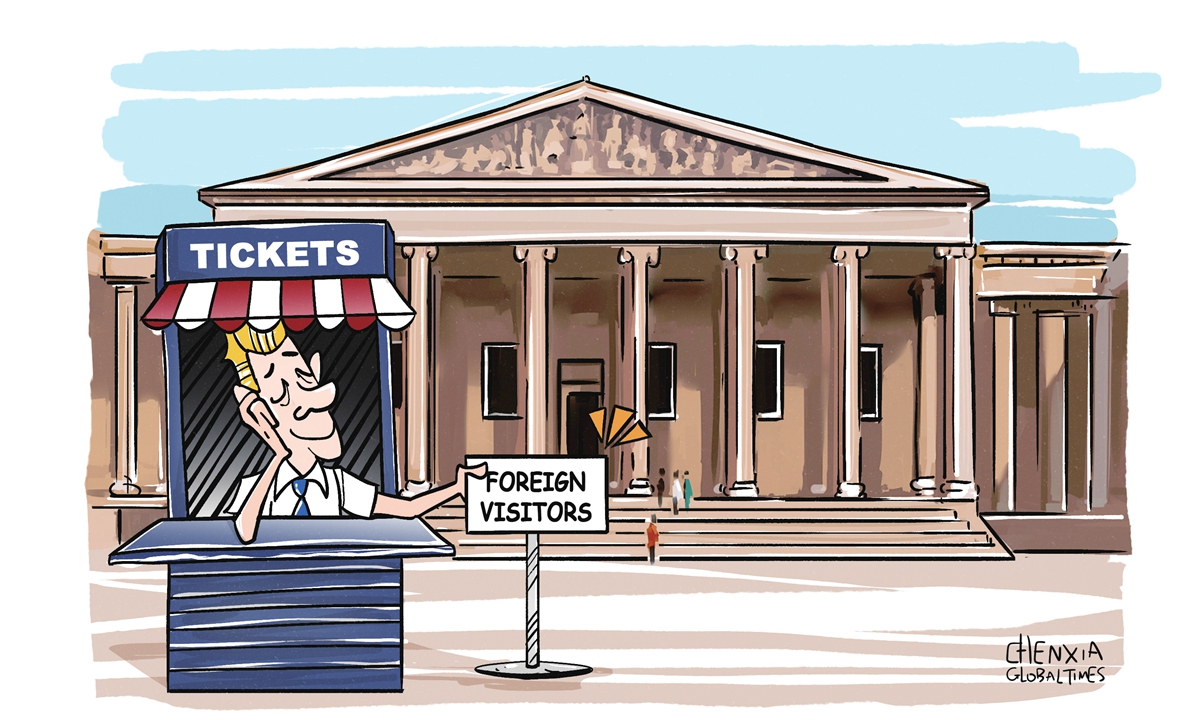
Illustration: Chen Xia/GT
The recent call by Sir Mark Jones, the former interim director of the British Museum in London, to charge admission fees to foreign visitors to the museum has sparked widespread discontent among Chinese netizens.
According to the Sunday Times, Jones has encouraged cultural institutions such as the British Museum, Tate Modern and Science Museum to levy an entrance fee on foreign tourists. If this proposal is implemented, it will end the long-standing tradition of allowing free access to public galleries in the UK.
Jones suggests that foreign visitors over the age of 25 should pay a 20-pound ($25.59) admission fee to visit major British museums and galleries, while British visitors and foreigners under 25 should continue to enjoy free access.
The outrage from Chinese netizens is understandable, considering the historical context. The British Museum houses numerous national treasures that were stolen from various countries during times of war and colonialism.
These actions have been internationally condemned, and many countries are demanding the return of these plundered artifacts. The museum has yet to respond positively to these calls. The proposal to charge overseas visitors for entry is seen by many as blatant disregard toward and an insult to the rightful owners of these cultural relics.
Imagine visitors from the origin countries of these lost cultural relics like Greece, Egypt and China, who have to travel to the UK to see their own national treasures, such as the Parthenon Marbles, the Rosetta Stone, and the murals of the Mogao Caves in Dunhuang, having to pay an additional 20 pounds to view what is rightfully theirs. This situation is not only absurd but also mocks the cultural heritage of these countries.
Jones justifies the proposal by citing a lack of funds needed for the museum's maintenance and expansion. According to the Independent, the British Museum is in need of up to 400 million to 500 million pounds for repairs to its leaking buildings and to develop more gallery and exhibition spaces to display millions of artifacts currently hidden from the public.
While the need for such developments is common among museums, not solving the funding issue through local government but instead charging foreign visitors while offering free access to domestic visitors is improper.
Museums have evolved to serve not only as repositories for collections and research but also as educational institutions. As an integral part of the public cultural service system, museums' three main functions are based on collections as the foundation, research as the means, and education as the goal. The proposed "double standard" in charging fees undoubtedly tarnishes the educational role of museums.
Jones said that the British Museum needs additional gallery space to showcase the "millions of artifacts the museum holds out of public view in its vaults." There is an old Chinese saying, "If you don't have a diamond, stay out of the porcelain business."
If the British Museum is not equipped to display such a vast array of global cultural relics, perhaps it should adopt a more humble and open-minded approach and proactively respond to international calls for the return of looted cultural artifacts.
At the recent conference titled "The Protection and Return of Cultural Objects Removed from Colonial Context" held in China, the call for the return of cultural relics was not a demand to "empty" museums, but rather a plea for enhanced cooperation and dialogue between countries of origin and the current possessors of looted artifacts.
The response from Jones, who proposed sharing the Parthenon Marbles between the UK and Greece, exemplifies a self-serving approach that reflects the arrogance and self-interest of Western powers.
By suggesting that the funds for such a partnership should be sourced from entry fees paid by foreign visitors, the UK avoids bearing the financial burden themselves, while simultaneously attempting to appear magnanimous.
This tactic not only sidesteps the ethical responsibility of the UK in the restitution of cultural heritage but also commodifies the issue, reducing it to a financial transaction rather than a matter of cultural respect and historical justice.
It is a clear demonstration of the need for a more genuine and equitable approach to the repatriation of cultural artifacts, one that acknowledges and respects the cultural sovereignty and heritage rights of the countries from which these objects were originally taken.
The British Museum's proposal to charge foreign visitors while offering free access to domestic visitors is not only a financial issue but also a matter of respect and responsibility toward the cultural heritage of the world.
It is high time for the museum to reconsider its stance and act in a manner that upholds the dignity and value of the cultural relics it holds.
The author is a reporter with the Global Times. life@globaltimes.com.cn




